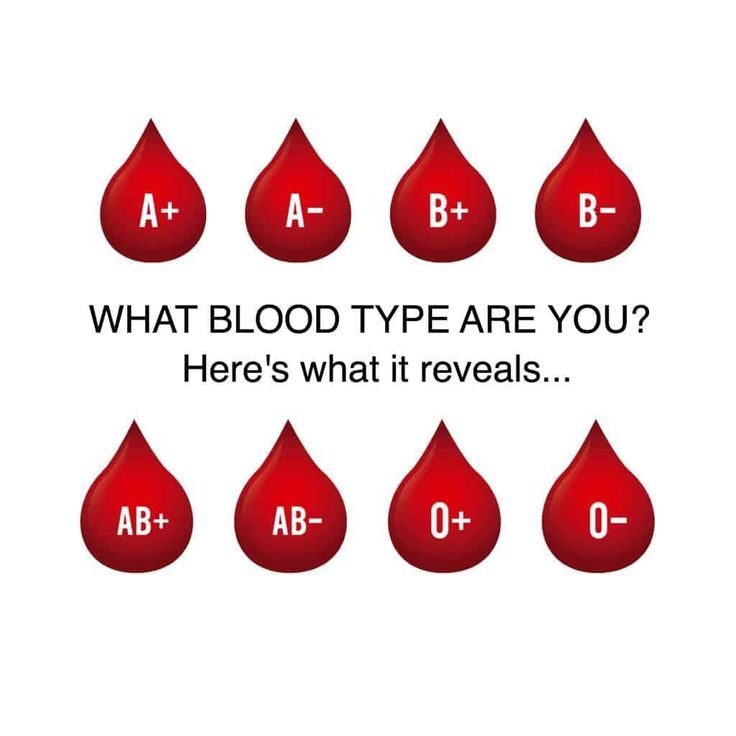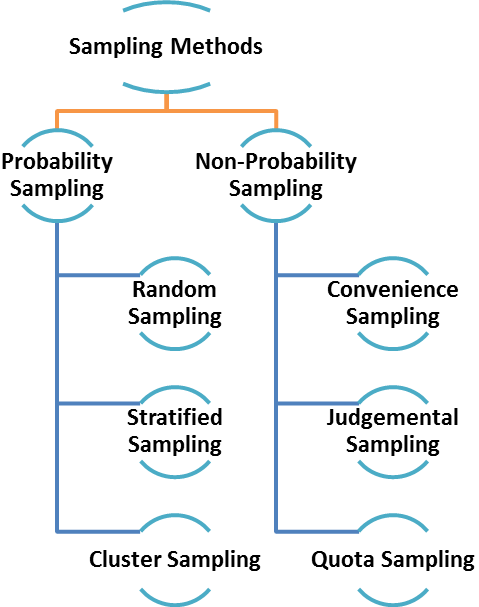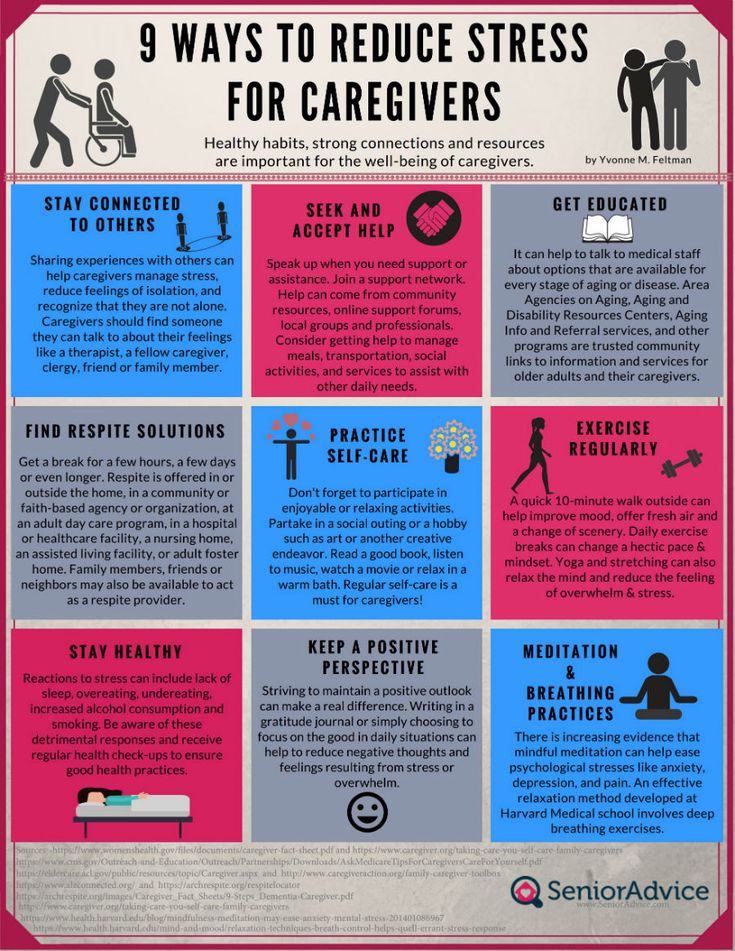What does my blood type say about me
What does your blood type mean for your health?
Blood types | Blood type rarity chart | How to find out blood type | How blood type is determined | Blood type compatibility | Healthiest blood types | Blood type diet | Blood type personality
If all you know about your blood is that it’s red, you have some catching up to do.
Blood is made up of a lot of different components. There are red and white blood cells, which carry oxygen and help fight infection, respectively. There are platelets, which help your blood clot. And there’s plasma, which provides the body with things like nutrients and hormones. Your plasma contains antibodies, which are substances your immune system uses to fight foreign invaders like germs and bacteria.
Your blood also contains antigens. These are proteins and other molecules present on the outside of your red blood cells; they determine what type of blood you have. Blood is further classified by its rhesus factor (aka, Rh factor). If your blood contains the Rh D factor—the most prevalent and important of the Rh factors—you have a positive blood type. If your blood lacks it, you have a negative blood type.
Categorizing blood according to type is important for things like blood transfusions, which replace blood that’s lost through surgery, accidents, and bleeding disorders. Mixing one type of blood that’s incompatible with another—thanks to things like antigens and Rh factor—can be fatal.
Healthy blood is essential for a healthy life. From typing to transfusing, here’s what you need to know about your blood and your health.
How many different blood types are there?
The vast majority of people have one of eight blood types. Blood types are based on the antigens (or lack of them) found on your blood cells and whether or not your blood contains the Rh D factor. Blood is typed according to an ABO blood group system. If your blood has A antigens, you have an A blood type. If you have B antigens, you have a B blood type. Some people have both A and B antigens, giving them AB blood. And people with an O blood type have neither A nor B antigens.
Each of those types are further broken down based on their Rh factor. For example, some people have A positive blood while others have A negative. A very small number of people have what’s called Rh null blood (also called gold blood), meaning it has no Rh factors at all. This is extremely rare, occurring in only a handful of people worldwide.
You may have the blood subtype Ro (a special marker on your red blood cells) if you are Rh positive. That means your blood type could be A+, B+, AB+ or O+. The Ro subtype is most common among African Americans (44%), and because this ethnic group is most likely to develop sickle cell disease, Ro subtype blood is more likely to be needed for blood transfusions. It takes 20 donors to provide enough blood for each sickle cell patient.
What is the most common blood type?
How common or rare a blood type is varies by race, ethnic background, and what part of the world you live in. According to the book Blood Groups and Red Cell Antigens, blood type B is common in people in Asia while blood type A is common in Central and Eastern Europe.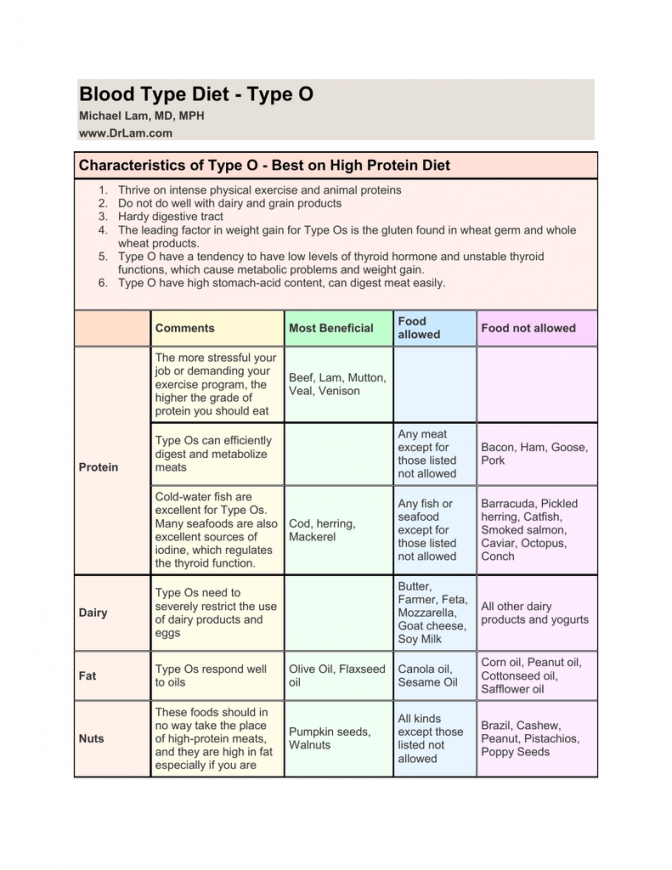 In the U.S. and Western Europe, O positive is the most common blood type, as is having a positive Rh factor. AB negative is the rarest. What about the rest of the blood types? The Stanford Blood Center provides these blood type percentages.
In the U.S. and Western Europe, O positive is the most common blood type, as is having a positive Rh factor. AB negative is the rarest. What about the rest of the blood types? The Stanford Blood Center provides these blood type percentages.
What’s my blood type? How to find out
There are three ways you can find out your blood type.
- Your healthcare provider can order a blood type test.
- You can donate blood. A typing test will be done and the results sent to you.
- You can purchase an at-home blood typing test. These tests usually involve pricking your finger and putting a drop of blood on a chemically treated card that looks for antigens and the Rh factor. You then match what you see on the card to a provided guide. Other tests may involve a saliva sample.
These tests aren’t foolproof, though. “There are certain scenarios in which we find discrepancies in our blood typing,” says Dr. Sharma.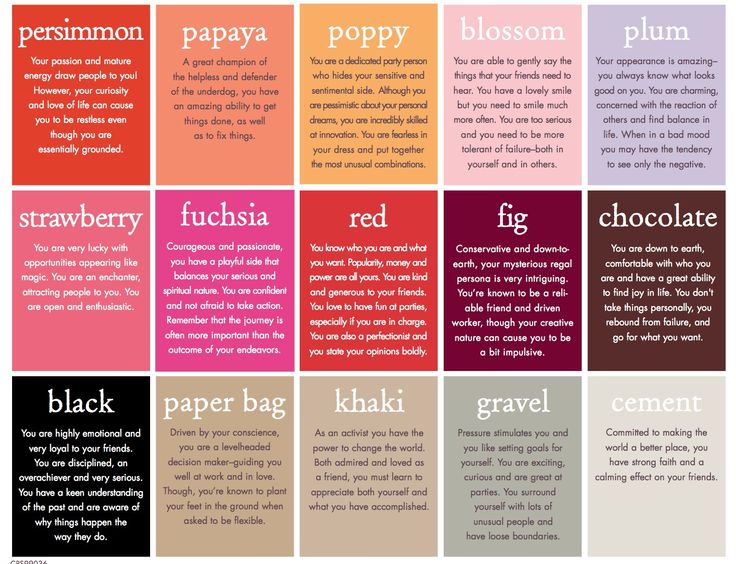 “This can occur in a person with a blood cancer, for example, or in someone who has had a recent blood transfusion or stem cell transplant.”
“This can occur in a person with a blood cancer, for example, or in someone who has had a recent blood transfusion or stem cell transplant.”
What your blood type says about you
What does your blood type say about your heritage?
Your blood type is inherited from your parents—and you can’t change it any more than you can change your eye color.
Each parent contributes one of their two A, B, or O alleles (a form of a gene) to a baby’s blood type. The O allele is considered recessive, which means it’s not always expressed. So if a woman with OO alleles has a baby with a man who has BB alleles, the baby will have a B blood type.
Can a baby ever have a blood type different from its parents? “It’s certainly possible,” says Deva Sharma, MD, MS, a hematologist-oncologist at Vanderbilt University Medical Center in Nashville, Tenn. “For example, an AO mother will have blood type A, and a BO father will have blood type B. However, there is a 25% chance they could have a baby with the blood type O (with inheritance of the OO alleles), and a 25% chance they could have a baby with an AB blood type (with inheritance of the A allele from the mother and the B allele from the father).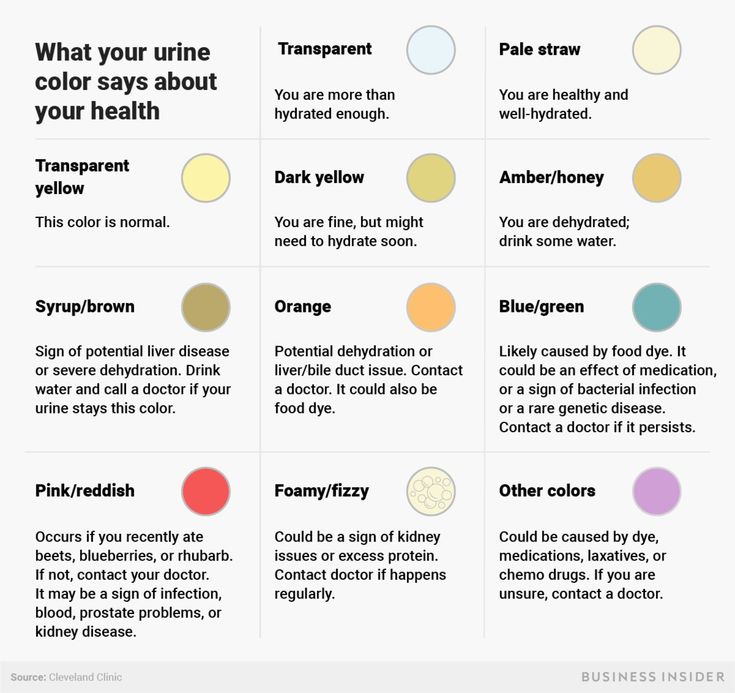 ”
”
What other combinations can occur? Emory University School of Medicine put together this chart:
Your Rh factor is also inherited, and like your blood type, you inherit one of two Rh alleles from each parent. So a baby receiving an Rh-positive allele from each parent will be Rh positive, and one receiving a negative Rh allele from each parent will be Rh negative. If you have one positive and one negative Rh allele (making you Rh positive, as the Rh-negative allele won’t be dominant), you could pass either one down to your child. Whether or not your baby will be Rh positive or negative will depend on what is also passed down by the other parent.
Who can I donate blood to?
While it seems counterintuitive, knowing your blood type isn’t absolutely critical. “Surprisingly, many people go through their entire lives without knowing their blood type and it causes them no harm,” says Jerry E. Squires, MD, Ph.D., a professor at the Medical University of South Carolina in Charleston. “Why? Because no hospital is going to transfuse a patient without first doing tests to determine the patient’s blood type. And, no, a hospital will not take a patient’s word for their blood type. I know that I am blood group A, but if I need blood, tests are going to be done first to make sure of my type and that safe red blood cell units are selected for my transfusion.”
“Why? Because no hospital is going to transfuse a patient without first doing tests to determine the patient’s blood type. And, no, a hospital will not take a patient’s word for their blood type. I know that I am blood group A, but if I need blood, tests are going to be done first to make sure of my type and that safe red blood cell units are selected for my transfusion.”
Getting transfused with a type of blood that isn’t compatible with yours can be deadly. That’s because antibodies in the foreign blood can trigger an immune response to attack against it, causing a cascade of problems. What blood types are compatible and which ones aren’t? According to Memorial Blood Centers, safe combinations include:
RELATED: Can I donate blood? Who can donate blood—and who can’t
What’s the best blood type to donate?
What happens if you’re in an emergency with no time for a blood type test? You’ll receive O- blood. Without any antigens or Rh D factor, O- blood is compatible with all other blood types. For that reason, people with O- blood are referred to as “universal donors.”
For that reason, people with O- blood are referred to as “universal donors.”
According to the American Red Cross, every two seconds someone in this country needs a blood transfusion. That makes blood donations particularly critical. “If you’re healthy, please be a blood donor,” Dr. Squires urges. “There is no substitute for blood, and if people don’t donate we will run out. That would mean no surgeries, no transplants, and no treatment for traumas.”
What is the healthiest blood type?
Can your blood type make you prone to certain diseases? While some experts say any possible effect blood type plays on health is insignificant at best, others say there’s a valid connection.
“The ABO antigens that make up our blood type are not only expressed on the surface of red blood cells, but they are also present in other human tissues as well,” says Dr. Sharma. “This provides the basis for ABO blood type to have clinical significance for various health outcomes outside the blood system. ”
”
What might some of those health outcomes be? According to Northwestern Medicine, studies show that:
- People with type O blood have the lowest risk of heart disease while people with B and AB have the highest.
- People with A and AB blood have the highest rates of stomach cancer.
- People with type A blood can have a harder time than others managing stress because they often produce more of the stress hormone cortisol.
- People with A and B blood types are at higher risk of developing blood clots than type O. They are also 51% more likely than those with type O blood to develop deep vein thrombosis.
- People with type O blood are more likely to experience more difficulty trying to conceive due to diminished ovarian reserve, or lower quality and fewer eggs than is normal.
- People with AB blood may be at greater risk of developing memory loss that leads to dementia later in life than those with other blood types.
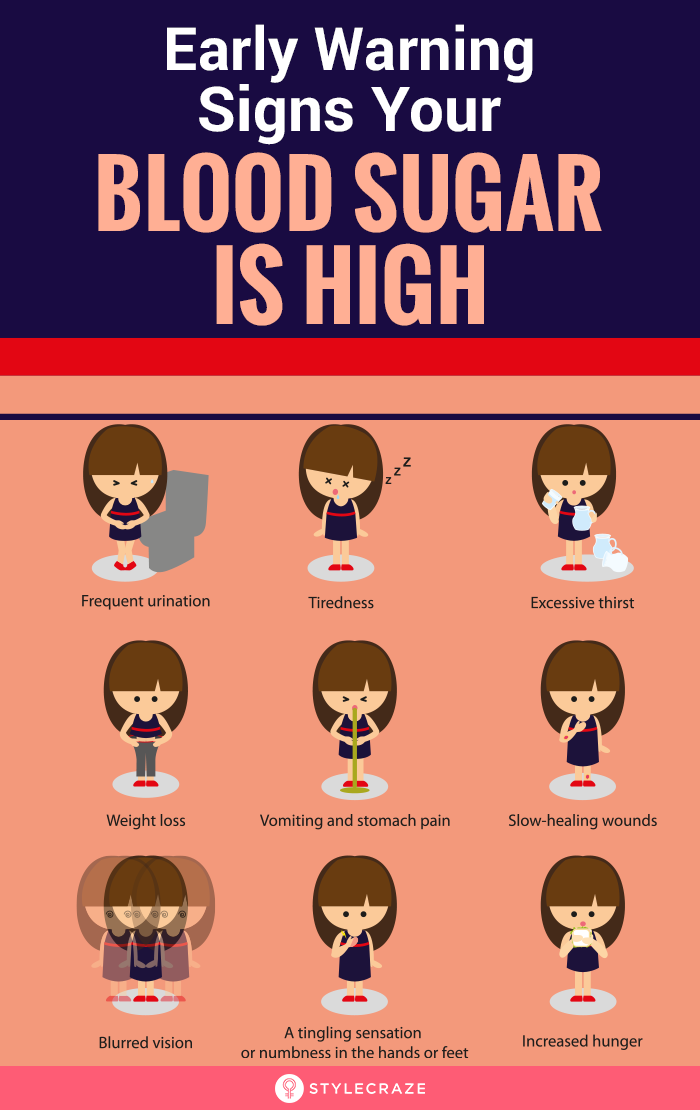
- People with A, B or AB blood may be at greater risk of diabetes than those with type O blood. In one study, people with B+ blood were at 35% increased risk of developing diabetes, followed by AB+ at 26% increased risk, A- at 22%, and A+ at 17%.
- People with A, B or AB blood may be at greater risk of certain cancers, including prostate, breast, colorectal, lung, liver, and cervical cancers than those with type O blood. The same is true of pancreatic cancer—people with type O are at a lower risk of developing the disease than those with A, B, or AB blood types
But when it comes to blood type and COVID-19 patients—the disease of the moment—there’s good news. According to a recent study from Harvard Medical School researchers published in the journal Annals of Hematology, blood type has no effect on how sick one becomes with coronavirus (despite initial claims that it might).
Are their diets based on blood type?
Naturopathic doctor Peter D’Adamo, ND, came up with a weight loss plan known as the blood type diet.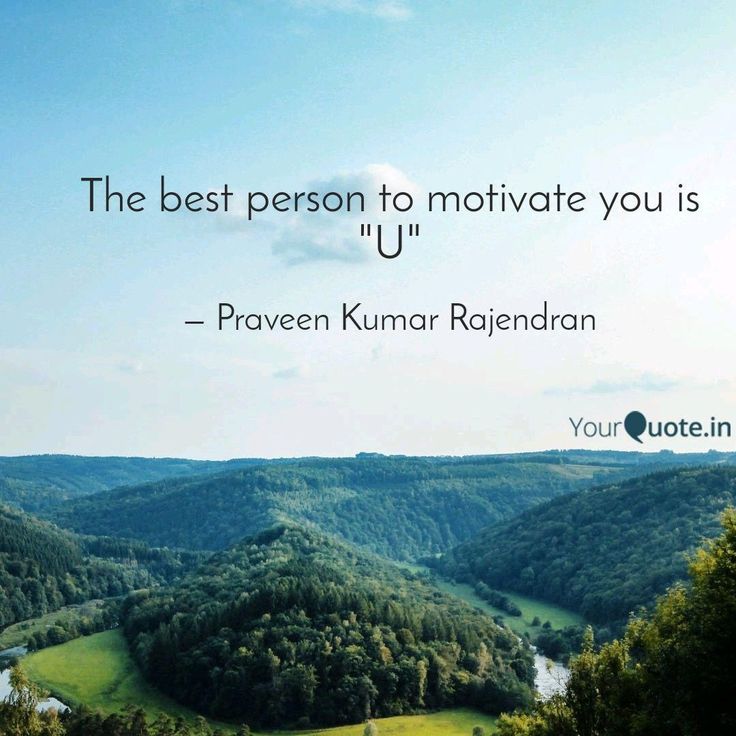 This eating plan says a person should eat according to their blood type. For example, if you have type A blood, you’d eat a vegetarian diet. If you have B blood, you can eat most foods, and those with type O blood should only consume protein and vegetables.
This eating plan says a person should eat according to their blood type. For example, if you have type A blood, you’d eat a vegetarian diet. If you have B blood, you can eat most foods, and those with type O blood should only consume protein and vegetables.
But a study published in the Journal of the Academy of Nutrition and Dietetics found that blood type had no effect on body weight, body fat percentage, plasma lipid concentrations, or glycemic control in individuals consuming a plant-based diet, thereby debunking the merits of the blood type diet.
Does blood type affect personality?
You may be wondering whether your blood type predicts your personality traits. While this is a popular belief, there is no scientific evidence to support the idea. In fact, according to a recent study, no correlation was found between personality and blood type. Similarly, research has found no significant correlation between blood type and intelligence.
What Your Blood Type Says About You: A Fun, Educational Look at Your Health and Personality
Resource Articles //
In honor of National Blood Donor Month, enjoy a bit of science and a drop of entertainment as we explore the implications of blood type.
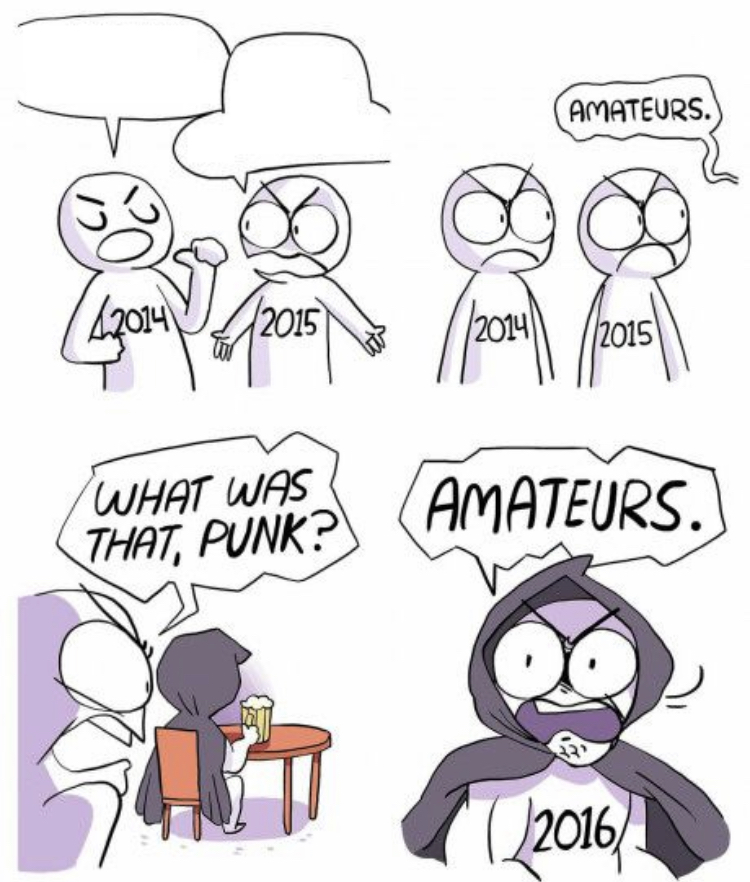
Ketsueki-gata. It’s a term that may once have only been familiar to phlebotomists and vampires. But since the 1930s, ketsueki-gata has become a popular means of analyzing a person’s personality based on their blood type, thanks to Japanese professor Tokeji Furukawa. While there is no scientific proof tying blood types to personality types, Furukawa’s claims have been embraced in Japanese culture—much like astrology has been accepted in the U.S.*
From a Western health science perspective, the four primary blood types are differentiated from each other based on their antigens. Antigens are found on the surface of the red blood cells and help dictate how effectively our immune system works. The connection to immunology has had health education researchers making a correlation between personal health patterns and blood types for centuries.
Though you’re not likely to ever study the blood-related personality types in a health science degree program, it is fun to decide for yourself whether ketsueki-gata principles apply to you.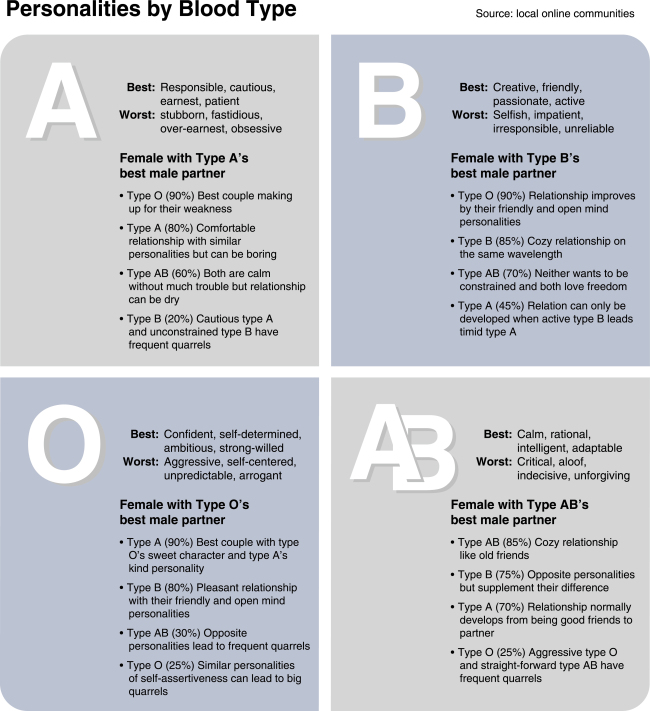 Here is a quick look at the pros and cons of our own hemoglobin, according to Western medicine and ketsueki-gata.
Here is a quick look at the pros and cons of our own hemoglobin, according to Western medicine and ketsueki-gata.
Health Implications Associated With Blood Types*
| BLOOD TYPE | PROS | CONS |
|---|---|---|
| A | Mosquitos are less attracted to you than to other blood types | 20% higher change of developing stomach cancer compared with types O and B 5% increased risk of heart disease compared with type |
| B | Type B has 50,000 times the number of strains of friendly bacteria than A or O types | 11% increased risk of heart disease than type O AB or B women have a raised risk of developing ovarian cancer |
| AB | Type AB+ is the universal plasma donor | 23% increased risk of heart disease compared with type O Pregnant women are at an increased risk for developing preeclampsia |
| O | Type O can donate red blood cells to anyone Lower risk for pancreatic cancer Lower risk of dying from malaria | More likely to get ulcers Higher risk of rupturing an Achilles tendon Mosquitos are highly attracted to you |
Ketsueki-Gata Personalities Associated With Blood Types*
| BLOOD TYPE | PROS | CONS |
|---|---|---|
| A | Earnest, creative, sensible, reserved, patient, and responsible | Stubborn and tense |
| B | Passionate, active nature, creative, and strong | Selfish, irresponsible, unforgiving, and erratic |
| AB | Cool, controlled, rational, and adaptable | Critical, indecisive, forgetful, and irresponsible |
| O | Confident, self-determined, strong-willed, and intuitive | Self-centered, cold, unpredictable, and a potential workaholic |
Whatever level of credibility you might find in ketsueki-gata, if you’re serious about exploring health sciences or finding a career in the field of health education, you might consider earning an online health degree, such as an MS in Health Education and Promotion.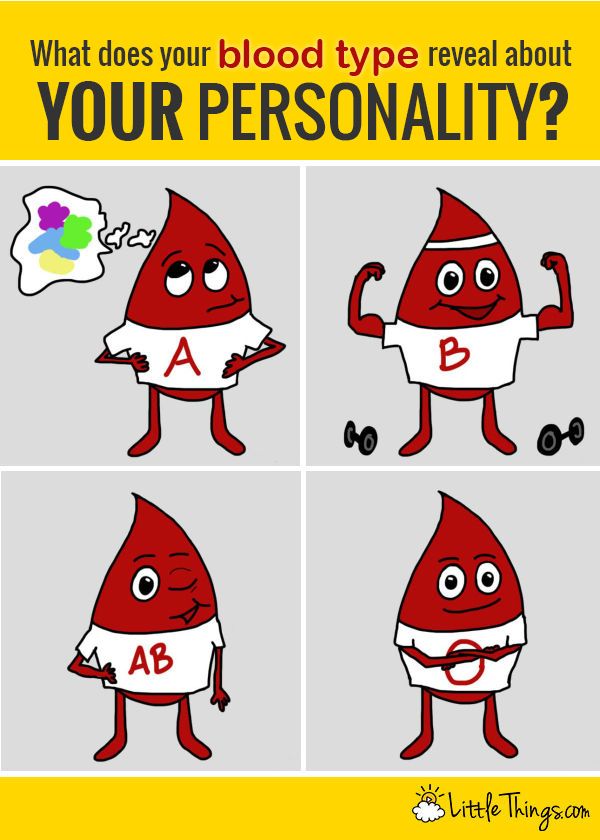 This degree can provide you with the skills and knowledge to make an impact on human health in multiple environments—including those we share with mosquitos. With an MS in Health Education and Promotion you can teach at a college of university, work as a researcher, or even take on the role of a consultant. Regardless, you’ll be helping others live a more healthy lifestyle.
This degree can provide you with the skills and knowledge to make an impact on human health in multiple environments—including those we share with mosquitos. With an MS in Health Education and Promotion you can teach at a college of university, work as a researcher, or even take on the role of a consultant. Regardless, you’ll be helping others live a more healthy lifestyle.
And regardless of whether you’re A, B, AB, or O, donating blood is always a positive contribution to your community.
*Mother Nature Network, “What Your Blood Type Says About You,” on the Internet at www.mnn.com/health/fitness-well-being/stories/what-your-blood-type-says-about-you.
Tell me your blood group and I'll tell you who you are
Komsomolskaya Pravda
blood can affect the character? Many scientists believe that this is due to the evolutionary process. Photo: GLOBAL LOOK PRESS
“Ketsu-eki-gata”
If we in Russia are asked: “What is your zodiac sign?” - then in Japan - "What is your blood type?" According to the Japanese, blood determines the character and individual characteristics of a person to a greater extent than distant stars.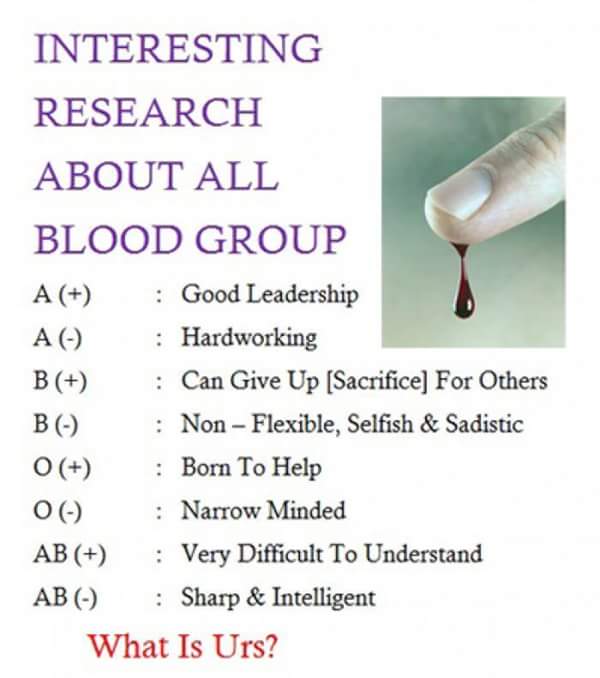 Carrying out tests and recording blood types is called “ketsu-eki-gata” here and is taken very seriously.
Carrying out tests and recording blood types is called “ketsu-eki-gata” here and is taken very seriously.
HR managers use "ketsu-eki-gata" when hiring employees, marketers to predict demand for prospective products, most people to choose friends and life partners. Devices that conduct an express analysis of the blood group “by blood stain” are often found at train stations, department stores, and restaurants. In Japan, and more recently in the US, there are even organizations called the AB0 Society to help individuals and business leaders make good decisions based on the characteristics of blood.
- It is possible that such services may appear in Russia, - says Alexander Sherman, a psychotherapist, senior researcher at the Human Health Research Center. - It's no secret that today in many commercial structures in the personnel department there are freelance astrologers and palmists who tell the bosses what kind of person to hire and for what position, where he could reveal all his talents.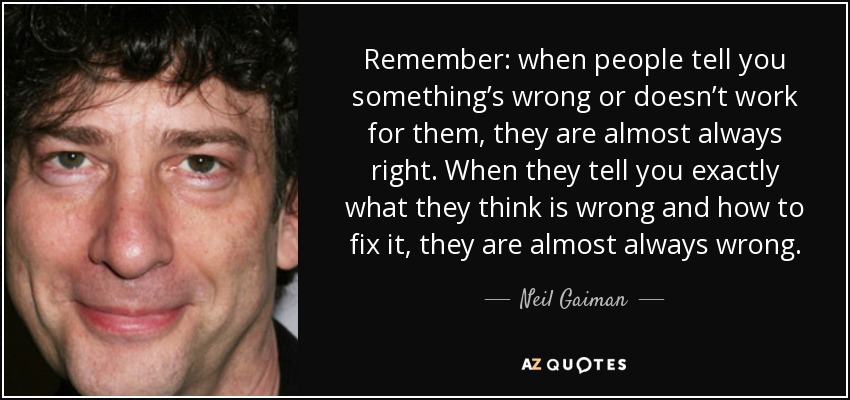 Therefore, in addition to a personal astrological (natal) card and a palm print, you may soon have to hand over a drop of blood to the employer.
Therefore, in addition to a personal astrological (natal) card and a palm print, you may soon have to hand over a drop of blood to the employer.
We are all brothers and sisters
But how can blood type influence character? Many scientists believe that this is due to the evolutionary process, during which, based on changing climatic conditions and lifestyle, the blood transformed its qualities.
- Blood type is older than race and more fundamental than ethnicity, says Dr. Sherman. - It is not the result of "trial and error" of genetic development, which is a sequence of accidents. Each of the blood groups was an evolutionary-logical response to a series of different changes that have occurred with the planet and "homo sapiens" over the millennia. Thus, the early racial changes began in a world that was almost entirely inhabited by the holders of group 0 (I). However, this division into races, associated with the adaptation of man to hitherto unusual nutrition, environment, climate, was also part of the driving force of evolution, which ultimately led to the appearance of other blood types.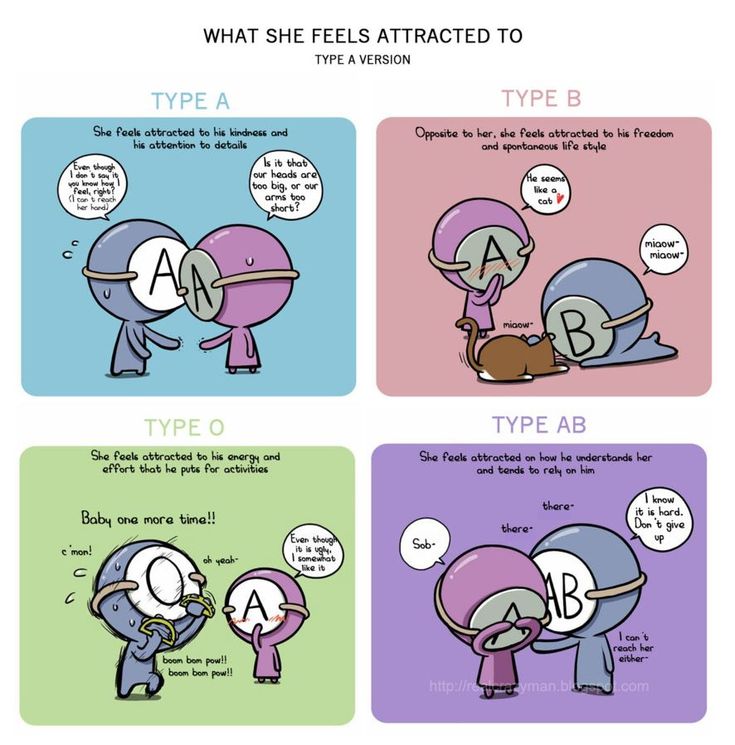
Some anthropologists generally believe that dividing humanity into races is too easy. Like, blood type is a much more important indicator of individuality than race. Indeed, an African and an Indo-European with group A (II) can exchange organs or blood, have the same habits, digestive functions and immune structures. But in an African with group A (II) and in an African with group B (III), for example, such coincidences are very rare.
Some anthropologists believe that dividing humanity into races is too simple, and blood type is a much more important indicator of individuality. Photo: EAST NEWS
- Ancestors left each of us a special legacy, the outlines of which are "imprinted" in the blood group, - says Alexander Nikolayevich. - And it is constantly present in the nucleus of every cell in the body. And people with the same blood type have a lot more in common than we ever imagined. Perhaps many of us are actually brothers and sisters. By blood. What is the AB0 system? And he discovered a curious pattern: in some people, they differ in sets of antigens - substances that cause an immune response and the formation of antibodies. The scientist designated the antigens found by the letters A and B. Some have only A antigens, others have only B. And the third have neither A nor B. Thus, Karl Landsteiner's research divided all of humanity into three parts, in accordance with the properties of blood : Group I (aka 0) - no A or B antigens; II group - there is A; III - with antigen B.
The scientist designated the antigens found by the letters A and B. Some have only A antigens, others have only B. And the third have neither A nor B. Thus, Karl Landsteiner's research divided all of humanity into three parts, in accordance with the properties of blood : Group I (aka 0) - no A or B antigens; II group - there is A; III - with antigen B.
In 1902, the researcher Decastello described the fourth group (antigens A and B are found on erythrocytes). The discovery of two scientists was called the AB0 system. It is based on blood transfusion.
People with the first blood group 0(I) are universal donors, since their blood, taking into account the AB0 system, can be transfused to people with any blood type. The owners of the fourth blood type AB (IV) - like Jesus Christ - belong to the category of universal recipients - they can be transfused with blood of any group.
However, now doctors are trying to transfuse an identical blood type to a person. This rule is deviated only in extreme cases.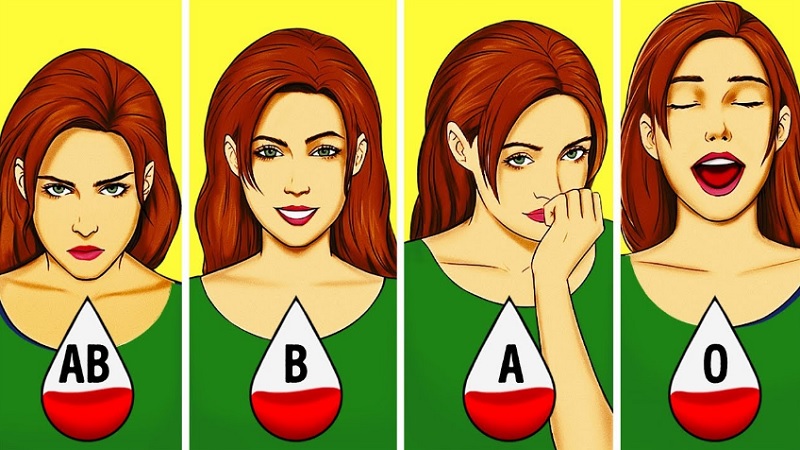
According to the Japanese, the blood type determines the character and individual characteristics of a person to a greater extent than distant stars. Photo: Aleksey BULATOV
PhD in Psychology Aleksey PRONIN:
- All attempts to classify people look somewhat ominous. If you say: "Type A is such and such" or "Type B is such and such", then sooner or later you will inevitably hear a statement like: "Type AB is better than all others" or "Only type 0 can be president." Thus, caste division can prevail. By the way, it is highly developed in Japan. For example, this can be seen in job advertisements, when a company announces a search for a person for a vacant position of a manager ONLY with blood type B. And if we elect the president of the country like this, will it lead to anything good?
What else can you find out about your loved one?
(Compiled by Japanese scientist Poshitake Nomi and American naturopath Peter D'Adamo)
Blood type
0 (I) "Hunter"; 40 to 50% of all people have it
Origin
The oldest and most common, appeared 40,000 years ago. Ancestors led a life of hunters and gatherers. They took what nature gave them today and did not care about the future. Defending their interests, they were able to crush anyone, regardless of who he was - friend or foe. The immune system is strong and resistant.
Ancestors led a life of hunters and gatherers. They took what nature gave them today and did not care about the future. Defending their interests, they were able to crush anyone, regardless of who he was - friend or foe. The immune system is strong and resistant.
Qualities of character
These people have a strong character. They are determined and confident. Their motto is: "Fight and seek, find and never give up." Excessively mobile, unbalanced and excitable. Painfully tolerate any, even the most fair criticism. They want others to understand them perfectly and instantly carry out their orders.
MEN are very skillful in love. Most of all they are excited by inaccessible women.
WOMEN are greedy for sex, but very jealous.
Tips
Try to get rid of narcissism and arrogance: this can seriously interfere with the achievement of goals. Stop fussing and rushing things. Remember that a person who strives to achieve what he has planned at any cost, indomitably striving for power, dooms himself to loneliness.
Blood type
A (II) "Farmer"; 30 - 40% have it
Origin
Generated by the first forced migrations of the population, it appeared when it became necessary to switch to food from agriculture and, accordingly, change the way of life. Appeared between 25,000 and 15,000 BC. Each individual was required to be able to get along, get along, cooperate with others within a densely populated community.
Qualities of character
Very sociable, easily adaptable to any environment, so events such as a change of residence or job are not stressful for them. But sometimes they show stubbornness and an inability to relax. Very vulnerable, hard to endure resentment and grief.
MEN are shy. Romantics in the soul, they express their love with a look. They love to feel maternal care, and therefore they often choose women older than themselves.
WOMEN are also shy. They make excellent wives - loving and devoted.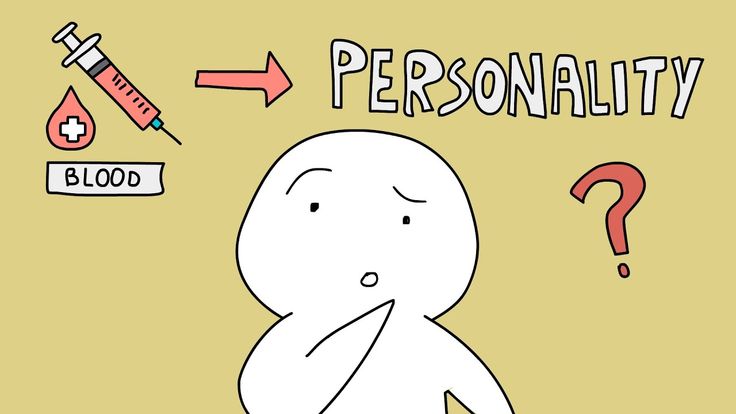
Tips
Do not aspire to leadership positions. But try to get like-minded people to support your interests. Do not relieve stress with alcohol, otherwise you will be overcome by addiction. And don't eat a lot of fatty foods, especially at night.
Blood type
B (III) "Nomad"; 10 - 20% have it
Origin
Appeared as a result of the merger of populations and adaptation to new climatic conditions more than 10,000 years ago. It represents the desire of nature to strike a balance between increased mental activity and the demands of the immune system.
Qualities of character
They are open and optimistic. Comfort does not appeal to them, and everything familiar and ordinary brings boredom. They are drawn to adventure, and therefore they will never miss an opportunity to change something in their lives. Ascetics by nature. They prefer not to depend on anyone. They do not tolerate an unfair attitude towards themselves: if the boss yells, they will immediately leave work.
They do not tolerate an unfair attitude towards themselves: if the boss yells, they will immediately leave work.
MEN are true Don Juan: they know how to beautifully look after women and seduce.
WOMEN are very extravagant. They can quickly win a man's heart, but they are afraid to marry them, not believing that they are capable of a reverent attitude to the family hearth. And absolutely in vain! Over time, they become good housewives and faithful wives.
Tips
Think about it: maybe your weakness lies in individualism? If there are no people close to you in spirit around you, then this is the result of your independence. Behind the reputation of a "womanizer" or "libertine" only the fear of love is masked. The wives of such people have to get used to cheating, because otherwise they are good family men.
Blood type
AB (IV) "Riddle"; only 5% of people have it
Origin
Appeared unexpectedly about a thousand years ago not as a result of adaptation to changing living conditions, like other blood groups, but as a result of mixing Indo-Europeans and Mongoloids.
Qualities of character
People of this type like to boast that the blood of the AB group was in Jesus Christ. The proof, they say, is a blood test found on the Shroud of Turin. Whether this is so has not yet been proven. But, in any case, people with the fourth blood group are quite rare. They have a soft and meek disposition. Always ready to listen and understand others. They can be called spiritualized natures and multifaceted personalities.
MEN attract with their intelligence and originality. Very sexy. But their desire to make love day and night does not mean at all that they are filled with deep feelings.
WOMEN are also sexually attractive, but they are very demanding in their choice of men. And her chosen one will not be easy, because she requires a lot of attention.
Tips
You have a major flaw: you are very indecisive. Maybe this is partly the reason for your lack of conflict: you are afraid to ruin your relationship with someone. But you are in constant internal conflict with yourself, and your self-esteem suffers greatly from this.
But you are in constant internal conflict with yourself, and your self-esteem suffers greatly from this.
BTW
The likelihood of dementia and early aging depends on your blood type
Research has shown that blood types play an important role in the development of the human nervous system. So, they can also influence the development of cognitive impairment [test yourself].
TESTED ON MYSELF
How I lost weight according to blood type
What would it be like to eat so as not to get fat? This question torments millions of women. The KP correspondent also asked them and decided to try a diet by blood group. Under the new nutrition system, the body was rebuilt in 2 months (details).
SEE ALSO
Millionaires have III blood type, workaholics have II
People are looking for reliable life partners, and HR managers are executive and creative employees, demanding from candidates a certificate from a hematologist indicating the blood type .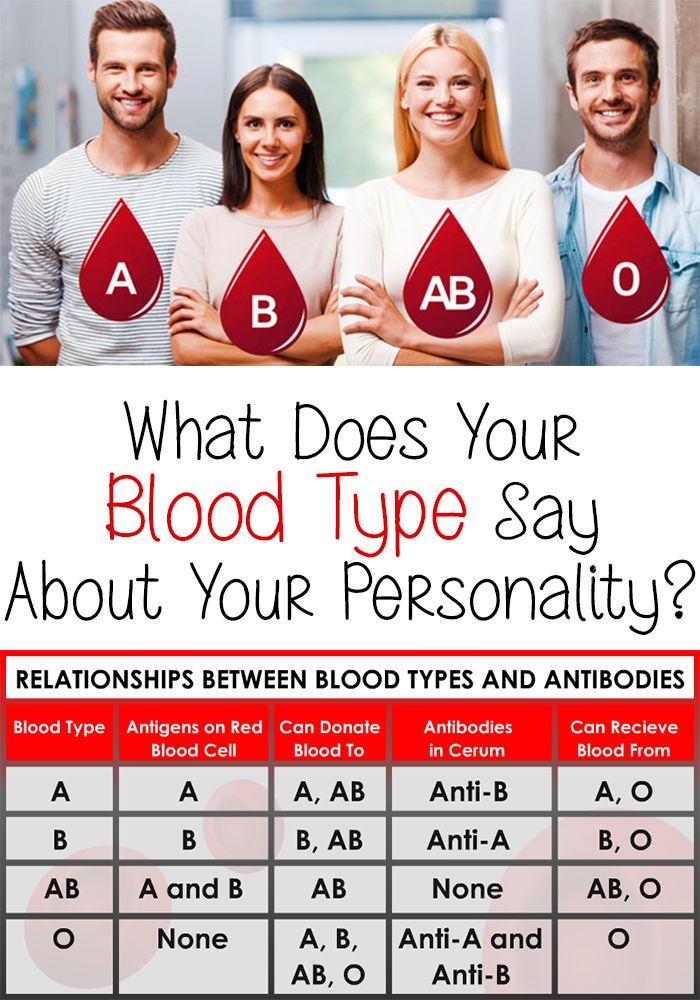 There is no such technique in Russia, but in Japan it is very popular (details).
There is no such technique in Russia, but in Japan it is very popular (details).
Age category of the site 18+
Online publication (website) registered by Roskomnadzor, certificate El No. FS77-80505 dated March 15, 2021
Acting EDITOR-IN-CHIEF - NOSOVA OLESIA VYACHESLAVOVNA.
I.O. chief editor of the site - Kansky Viktor Fedorovich
Messages and comments from readers of the site are posted without preliminary editing. The editors reserve the right to remove them from the site or edit them if the specified messages and comments are an abuse of freedom mass media or violation of other requirements of the law.
JSC "Publishing House "Komsomolskaya Pravda". TIN: 7714037217 PSRN: 1027739295781 127015, Moscow, Novodmitrovskaya d. 2B, Tel. +7 (495) 777-02-82.
Exclusive rights to materials posted on the website www.kp.ru, in accordance with the legislation of the Russian Federation for the Protection of the Results of Intellectual Activity belong to JSC Publishing House Komsomolskaya Pravda, and do not be used by others in any way form without the written permission of the copyright holder.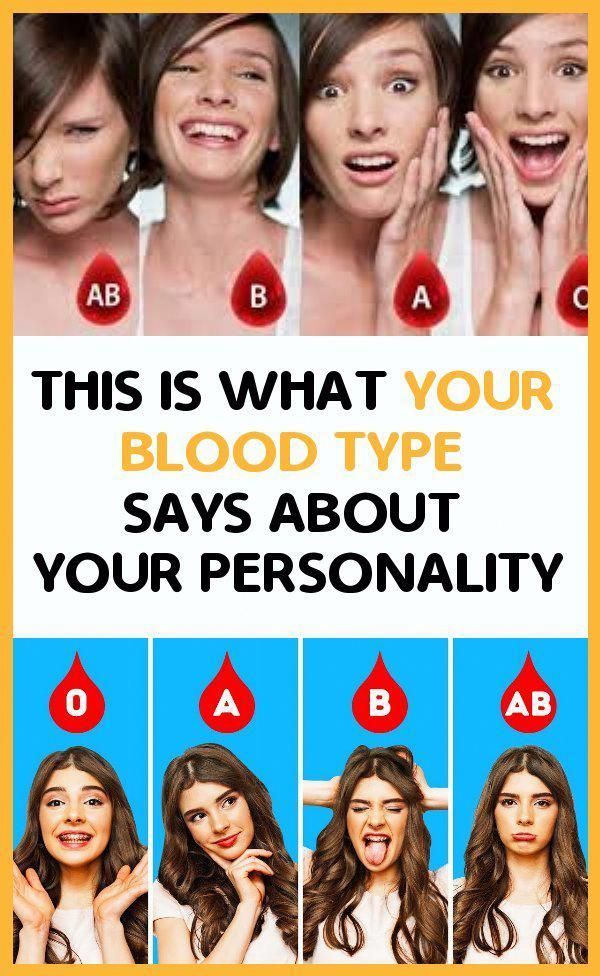
Acquisition of copyrights and communication with the editors: [email protected]
Personality by blood type
Personality by blood type: YouTube/AdMeNearly a hundred years ago, Karl Landsteiner received the Nobel Prize for discovering blood groups. However, the character of a person could not yet be determined by them. This connection was discovered by Japanese scientists, and since then the technique has been used all over the world. Use the information to understand yourself and your environment.
Group I (O+ and O-) — "hunters"
The theory of the relationship between blood type and character says: everything started with them - with the owners of the first blood group. These people laid the foundation for evolutionary processes, managed to survive in the difficult conditions of the Stone Age and gave strong offspring.
"Hunters" had to rely on primitive, natural instincts, as well as demonstrate determination in achieving goals.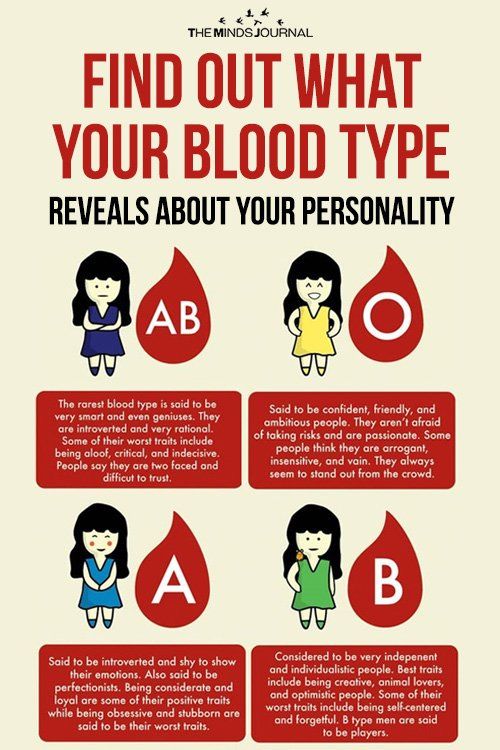 They didn't care about yesterday, they strove for the future.
They didn't care about yesterday, they strove for the future.
The current descendants with the first blood group demonstrate the bright features of their ancestors:
- energy and self-confidence;
- lack of fear of any obstacles, enterprise;
- purposefulness and the ability to go forward to the end.
They are born leaders. They need specific goals in order to take the most desperate steps to achieve them. They are stubborn and independent, have an innate instinct and know how to choose the best option from those offered by fate.
Their shortcomings:
- They cannot stand criticism.
- They do not know how and do not like to obey.
- It is practically impossible to change your mind about anything.
- Hardly endure a change of scenery.
A strong character allows "hunters" to take a leading position in life and in business. Monotonous work, lack of competition and space for growth tire them. Some representatives need a drive, an opportunity for development.
Some representatives need a drive, an opportunity for development.
When it comes to business matters, they see only boredom and routine. Of course, they put up with the fact that they need to be solved, but only for the sake of a comfortable life.
In relations with the opposite sex, representatives of the group demonstrate jealousy, possessiveness. But all the shortcomings are more than compensated by their endless tenderness and care for a partner. "Hunters" are sensitive and sensual, love earthly pleasures and know how to build harmonious relationships on the principles of equal exchange.
Group II (A+ and A-) - "farmers"
By blood type, you can determine the character: PixabayRepresentatives of the second blood group are cold-blooded, balanced, sensible people. External simplicity is a mask under which a multifaceted personality is hidden. Very conscientious in any work, although they can do it too slowly. Of the shortcomings, we note such as:
- the tendency to give up one's opinion, choosing someone else's;
- excessive pettiness and scrupulousness;
- the inability to relax and the risk of panic if things don't go according to plan.
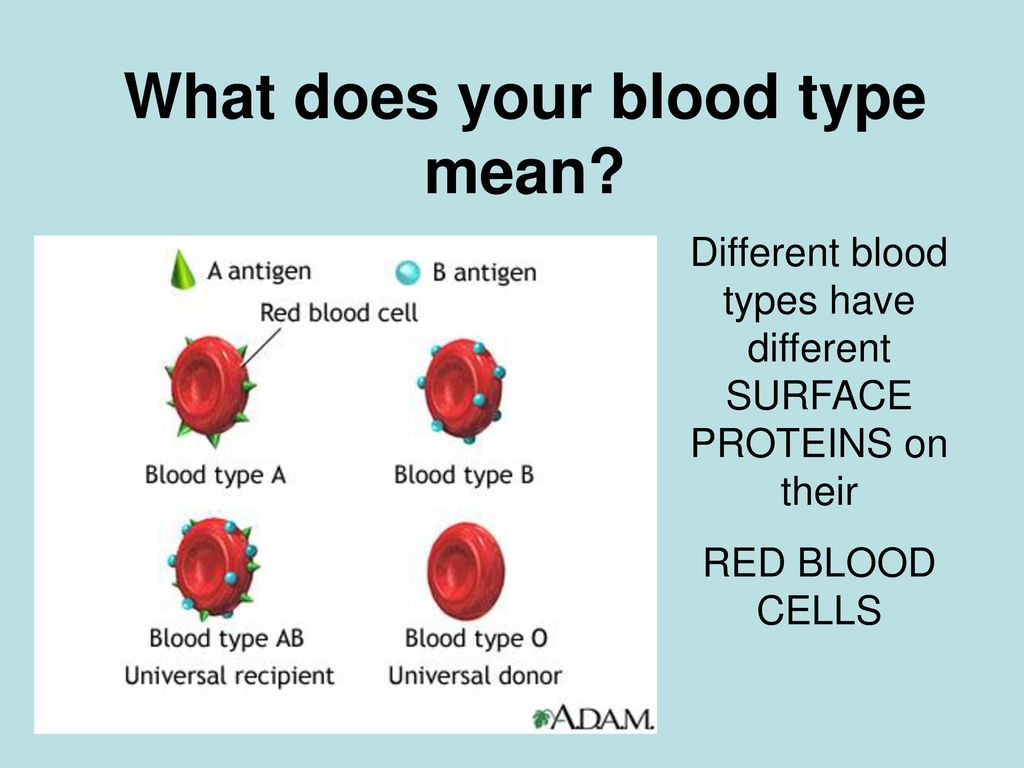
"Farmers" are secretive and in no hurry to turn the soul inside out, but they are able to analyze the situation, carefully observe and draw conclusions. They do not allow emotions to take over the mind, they rely on themselves in everything and will not once again ask for help, although they are always happy to rush to help others.
Unfortunately, they do not grow into leaders, but they are excellent performers, on which the entire structure of most companies rests. They will never let you down and will do everything that depends on them to solve the task.
Some aloofness makes them mysterious people who want to get to know better. Here are the positive character traits of the group's representatives:
- Loyal friends and associates.
- They collect other people's secrets, but they never give them away, often they are a "vest" for friends.
- Don't use people's weaknesses against them.
- Non-confrontational, prone to compromise, kind and responsive.
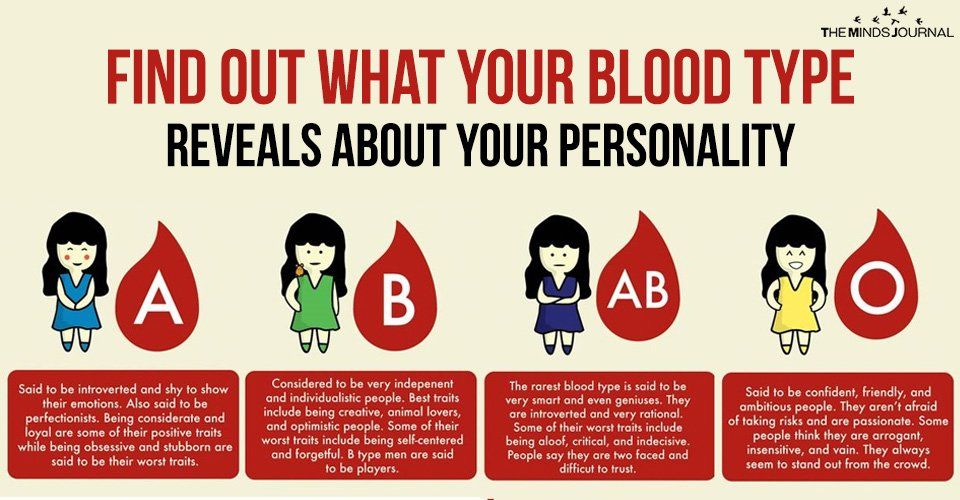
Rare fits of irritation and isolated outbursts of rage demonstrate the inner fire of "farmers". They also indicate that such people are very good at sex, despite seeming restraint.
They are very fond of order and cleanliness in the house, that's why they are also called "brownies" or "housekeepers". They are patient in building relationships and will listen to a partner, yield to him without strain and blackmail. Loyal and loving, "farmers" seek to meet their man and rarely break off relationships on their own initiative.
Group III (B+ and B-) - “nomads”
People with different blood types have common features: Pixabayrare tricks. They are also called "nomads" or "wanderers" because of the permanent thirst for change. Their characters combined the strongest features of the first two groups.
They are distinguished by the following qualities:
- easily adapt to any conditions;
- they cannot be driven into a dead end;
- know how to establish contact with any people;
- purposeful and self-confident;
- are intelligent and emotionally sensitive.
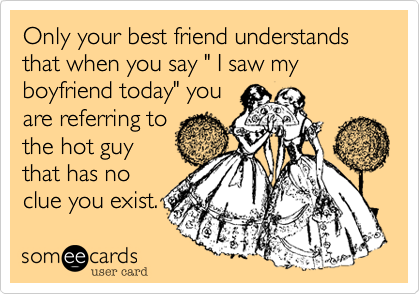
These people love a change of scenery, are restless and believe that they need to travel around the world or at least half of it. Often they succeed, how to achieve everything in life.
In the process of evolution, "nomads" have developed the ability to maintain balance. They prefer not to get involved in conflicts, feeling the fine line between good and bad. Sharp intuition turns them into wise advisers, people look for support in them. Great friends, they know how to keep their word.
Character flaws include:
- excessive vulnerability and sensitivity;
- excessive talkativeness and intrusiveness;
- attempts to hide from people, and outwardly demonstrate otherwise;
- a tendency to dramatize in love — they can suffer endlessly for those who did not choose them.
Representatives of the third group are endowed with creative talents and can be realized in the field of art. They will suit the profession of a designer, builder, writer, actor. They can manage people, they are not afraid of responsibility.
They can manage people, they are not afraid of responsibility.
In a relationship, they look for their soul mate for a long time, they often fall in love with the wrong ones. Having chosen the right party, they are ready for anything to maintain relationships. Such people make good parents and spouses.
Four blood groups have occurred in the course of evolution: PixabayGroup IV (AB+ and AB-) — "inventors"
They were called inventors for a reason, as well as philosophers and sages. By nature, they are very intelligent, sociable and friendly. They love to joke, including on themselves. They combined the main character traits of people of the second and third blood groups.
After weighing all the pros and cons for a long time, wise "inventors" can slow down in making decisions, but rarely make mistakes. Most of all they are loved for:
- charm and ability to arouse interest;
- the ability to be devoted friends;
- lightness and love for fun;
- that they do not boast of status, intelligence or merit.

These people love and know how to sympathize and empathize, real altruists. They have angelic patience, although no one is allowed to sit on their neck. If you strongly offend the "inventors", then unpleasant, but very precise words will be heard against the offender, which hurt pride painfully.
They also have negative traits:
- They often doubt themselves, tend to introspection.
- Can chew past negative events for a long time, trying to analyze mistakes.
- They know how to perfectly pretend and lie (sometimes this becomes a plus).
"Inventors" love their partners very much. At the beginning of a relationship, they are even ready to forgive the betrayal of a loved one in order to stay together. But if later they meet someone more worthy and understanding, then, without waiting for a confession of guilt from a partner, they will leave. They burn bridges, turning into cold exes, with whom it is difficult to agree on the division of property and custody of children.